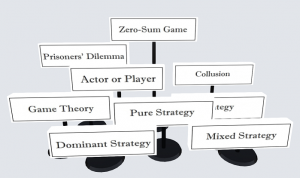
Actor or player = an individual, organization, agency, government, or business that is involved in a game with other actors.
Collusion = an agreement between two or more persons, sometimes illegal and therefore secretive, to limit open competition by deceiving, misleading, or defrauding others of their legal rights, or to obtain an objective forbidden by law typically by defrauding or gaining an unfair advantage.
Dominant strategy = the strategy that is best for a player in the game (regardless of the strategies chosen by the other player in the game).
Game theory = a branch of mathematics that deals with the analysis of games (i.e., situations involving parties with conflicting interests). In addition to the mathematical elegance and complete “solution” which is possible for simple games, the principles of game theory also find applications to complicated games such as cards, checkers, and chess, as well as real-world problems as diverse as economics, property division, politics, and warfare.
Mixed strategy = a mixed strategy is an assignment of a probability to each pure strategy. This allows for a player to randomly select a pure strategy. Since probabilities are continuous, there are infinitely many mixed strategies available to a player, even if their strategy set is finite.
Monopoly = a business entity that is the only seller of a type of product (without close substitutes).
Nash equilibrium = whenever a game has a combination of strategies such that each player’s strategy is the best the player can choose, given the strategy chosen by the other, that pair of strategies is called a Nash equilibrium.
Oligopoly = a market controlled by a small group of firms (or at least two firms).
Outcome/payoff matrix = a payoff matrix is a decision analysis tool that summarizes pros and cons of a decision in a tabular form. It lists payoffs (negative or positive returns) associated with all possible combinations of alternative actions (under the decision maker’s control) and external conditions (not under decision maker’s control). Also called payoff table.
Prisoners’ dilemma = a “game” between two captures prisoners that illustrates why cooperation is difficult to maintain even when it is mutually beneficial to cooperate.
Pure strategy = a pure strategy provides a complete definition of how a player will play a game. In particular, it determines the move a player will make for any situation he or she could face. A player’s strategy set is the set of pure strategies available to that player.
Strategy = a player’s strategy in a game is a complete plan of action for whatever situation might arise; this fully determines the player’s behavior. A player’s strategy will determine the action the player will take at any stage of the game, for every possible history of play up to that stage.
Tit-for-tat strategy = includes mimicking your rival’s action – renege or cooperate – in subsequent rounds of play.
Zero-sum games = a special case of constant-sum games, in which choices by players can neither increase nor decrease the available resources. In zero-sum games the total benefit to all players in the game, for every combination of strategies, always adds to zero (more informally, a player benefits only at the equal expense of others).